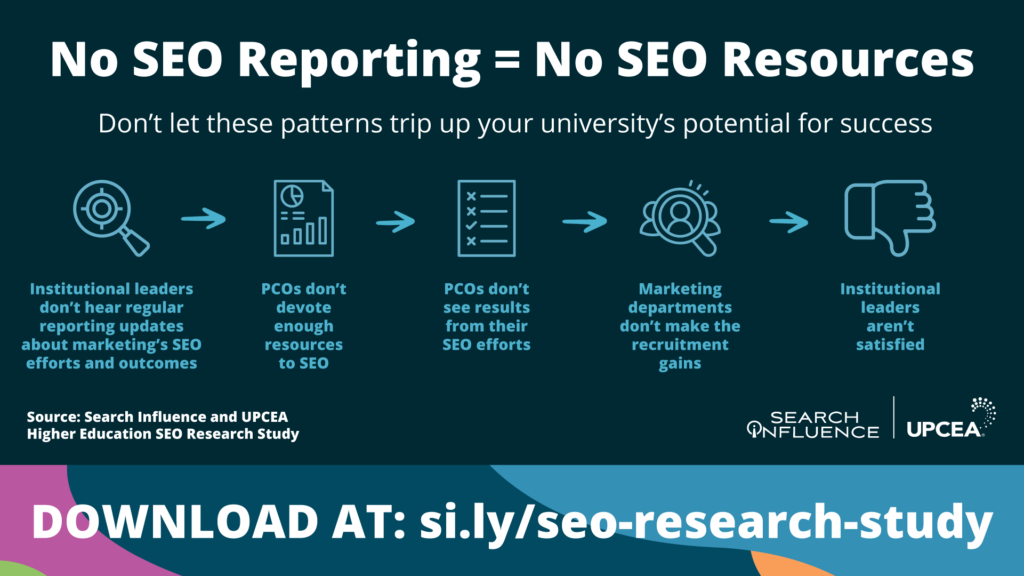From the Minds of Higher Education Marketing Experts: Highlights From the UPCEA SEO Research Study
June 13th, 2023 by
Key Insights
- Universities are investing in paid search, which demonstrates they see search as an important part of the prospect’s journey.
- However, SEO does not get this same level of investment.
- SEO is an underleveraged opportunity for schools to increase enrollment.
- SEO is critical in reaching prospective students and the new adult learner.
- Performing SEO at an expert level, backed by a strategy, could improve results.
Search Influence joined forces with the University Professional Continuing Education Association (UPCEA) to release our highly anticipated Higher Education SEO Research Study.
This three-part research study aimed to understand institutional and marketing leaders’ perspectives on search engine optimization (SEO) and evaluate the SEO readiness of professional, continuing, and online education (PCO) units within higher education institutions.
We have now spent a few months discussing the results and understand how our findings could be useful to a variety of professionals — even beyond the scope of higher education. To get some fresh perspectives on our research, I sought the insights of several industry leaders, including Search Influence Co-Founder and CEO Will Scott, Search Influence Co-Founder and COO Angie Scott, Search Influence Director of Account Management, Alison Zeringue, UPCEA Chief Research Officer, Jim Fong, and Co-Founder and CEO of SearchLab, Mark Bealin.
Investment in Paid Search Shows Importance of Search Overall
Alison Zeringue, Search Influence Director of Account Management, Alizon Zeringue
Our Director of Account Management Alison Zeringue noticed the stark contrast in investment between paid advertising campaigns and organic search amongst higher education institutions. Alison has spent the last six years developing her higher education SEO expertise (on top of many years prior in SEO and marketing).
91% of respondents indicate they integrate paid search into their SEO strategy. Anecdotally, almost all higher education institutions we’ve encountered run some type of paid search advertising (usually on Google). With so many universities investing in paid search, we know that they see the value in search overall as part of the prospective student journey.
So, why do 51% of universities indicate that they don’t have a strategic SEO plan?
We attribute the disparity in investment in paid search over SEO to a few things:
- SEO is harder to understand (but a well-crafted paid search campaign can also be quite complex if you take advantage of all features available).
- SEO takes continual human effort over time (although paid search needs continual optimization to be most effective).
- Paid search can be easier to tie to enrollment (but it is possible to do this with SEO too).
- Paid search results can be more tangible (and if you know what metrics to track and how to report on SEO success, SEO results can be tangible as well).
- SEO can be seen as something that is part of the ongoing website work and doesn’t need a dedicated investment in budget (but in order to assure you are truly able to compete on Google, a dedicated SEO investment is as critical as your paid search investment).
“Wow, What an Opportunity!”
Mark Bealin, Co-Founder and CEO at SearchLab and Host of Search and Suds Podcast
I recently appeared on Suds and Search, the popular digital marketing podcast hosted by Co-Founder and CEO of marketing agency SearchLab Mark Bealin. As an SEO industry veteran, Mark was blown away by the amount of headroom there is for professional, continuing, and online departments to leverage SEO as a tactic.
The study showed that these institutions don’t take advantage of SEO at the pivotal moment when they need to appeal more to adult learners. Basic SEO strategies and tactics are easily overlookable. Reports aren’t always reliable or understood.
This presents a big opportunity for universities and colleges that recognize the disconnect in their digital strategies.
SEO metric reporting was a significant theme throughout the report and demonstrated leaders aren’t well-informed about SEO metrics.
The data indicates that 62% of higher education institutional leaders want reporting on SEO metrics, but just 31% receive regular updates. This, and other data points in the study, highlight a self-perpetuating pattern:
Institutional leaders don’t hear regular reporting updates about marketing’s SEO efforts and outcomes. Therefore, they don’t push for or support SEO resources, and, consequently, they don’t get SEO results.
Greater Higher Education SEO Expertise Could Improve Results
Angie Scott, Co-Founder and COO at Search Influence
Our Co-Founder and COO Angie Scott, in addition to her financed-focus, heads our HR operations — meaning she’s in tune with the skills and capabilities needed to perform a job well.
Angie found it interesting that institutions graded their SEO capabilities an average of 3.5 on a scale of 1 to 5, where a 1 is not very capable and 5 is extremely capable.
She wondered: Wouldn’t you want something this important performed at an expert level?
What skills are needed to perform higher education SEO effectively?
- Research and analytical abilities
- Technical website development expertise
- Copywriting
- Graphic design
- Public relations/media outreach
- Strategic thinking and creative problem solving
The skills needed to perform SEO well in the higher education industry are not likely to be found in one single individual, or even two. Beyond having the baseline skill set of each, higher education SEO marketing experts must be able to stay up-to-date with trends and work closely with evolving technology to keep their strategies ahead of the curve.
Executing SEO Tactics Without a Strategy Is a Missed Opportunity
Will Scott, Co-Founder and CEO at Search Influence
Co-Founder and CEO Will Scott pointed out that, although many institutions are doing tactics that are part of SEO, they don’t perform them strategically. This means they miss valuable opportunities for the tactics to have the greatest impact on enrollment success.
Others don’t necessarily perform SEO tactics with intention. This was evident in the study from the assessment of 100 websites, in which universities had an average score of 58.6. Less than half (47%) of UPCEA members had a score above 60.
What does it look like to perform SEO strategically in higher education?
- Targeted keywords per program/degree/certificate page (based on research)
- Content plan for each offering (pillar pages with cluster content, including related blog posts, videos, and/or graphics)
- Linkbuilding plan for each targeted program or degree
- Cadence for monitoring technical site health
- Identified key performance indicators (KPIs) and reporting plan
Learn more about how to apply these strategies and tactics in the replay of our webinar, UPCEA Higher Education SEO Research Study: How to Impact Your Enrollment.
SEO Is Critical to Reach the New Adult Learner
Jim Fong, Chief Research Officer at UPCEA
Last but not least, let’s summarize the takeaways from UPCEA’s Chief Research Officer Jim Fong. If you are in higher education marketing and haven’t yet heard of or from Jim, you’re in for a treat. He’s a legend and a treasure trove of knowledge and insight for higher education leaders and marketers alike.
Jim has heavily researched and analyzed changing demographics and how that ties into the need for colleges and universities to focus and lean into new offerings for the adult learner. He also speaks to unique challenges in the fact that the new adult learner is much younger than some may picture, can be harder to reach, and, is much savvier than students of the prior generation. The new adult learner spends more time researching educational opportunities in their evaluation process — which includes using search engines to look at their options. (Read more about Jim’s perspective in his blog post, Greeting the Student of the Future on their Terms at the Digital Storefront.)
Jim’s preface to the full higher education research study prescribes four clear actions and observations:
- PCO units need to abandon legacy and focus more on the new adult learner in the design of their websites.
- There needs to be more emphasis on search engine optimization, as opposed to locked-in institutional templates and over-design and creativity.
- Metrics should play a bigger part in the continuous improvement and planning process.
- Institutions need to have a clear strategy for their websites and how to integrate the needs of the adult learner into the process.
The data is clear — SEO is an underleveraged tactic for universities to boost enrollments.
To me, this is very exciting. While many may think “we’re doing everything already,” this data shows that a lot actually aren’t. And that translates to new ways to reel in even more students that you may not have already explored in your other enrollment marketing efforts.
To view all of the data from the three-part study, download our Higher Education SEO Research Report. There’s also a webinar replay available, which gives you highlights of the study in addition to best practices on how to address the opportunities in our findings.
You can also learn even more about higher education digital advertising and marketing services with Search Influence here.



